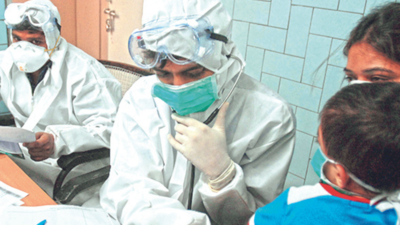- News
- City News
- hubballi News
- Measures taken to prevent epidemics in Hubballi
Measures taken to prevent epidemics in Hubballi

In the last nine months, the Hubballi health department has tested 1,500 people for dengue, and more than 100 for H1N1
HUBBALLI: As flooding incidents triggered by heavy rain are likely to increase chances of outbreak of infectious disease in affected areas, the district health department has intensified measures to mitigate the impact of possible epidemics.
The district administration has instructed all taluk hospitals, primary healthcare centres, urban healthcare centres and other local hospitals to ready enough beds, medicines and other facilities, to provide timely treatment to people who visit hospital, with symptoms of malaria, dengue, chikungunya and other infectious diseases.
While no case of malaria has been reported in the district for the past three years, cases related to dengue and H1N1 have been recorded at hospitals.
The district has recorded 128 dengue cases, seven H1N1, and 31 cases of chikungunya from January to September 7 this year. Citing possibility of a rise in infectious diseases in the season, Dr B C Karigowder, district health officer, Dharwad, told TOI that the department officials have started visiting villages and places which were affected by heavy rain and floods, to take stock of the situation. The department has opened health clinics at gruel centres and villages affected by floods, where he said, “Doctors and health workers are working round the clock to ensure people are safe from diseases.”
“We are running blood tests and other diagnostics, if we come across any suspected cases of dengue, chikungunya and other diseases. There aren’t any signs of an outbreak yet,” Dr Karigowder added. Health workers are also visiting residents of affected villages, to raise awareness about epidemics.
In the last nine months, the district health department has recorded testing of 1,500 people for dengue, and more than 100 people for H1N1. Besides, Arogya Raksha Samitis formed at the public healthcare centre (PHC) level, have been given the power to make use of government funds, to get more medicines and other facilities, in case of emergency situations. All doctors and health staff have also been trained and instructed appropriately, he said.
“I am also personally visiting each village, to take stock of the situation, and to monitor facilities available in PHCs and health clinics,” Dr Karigowder said.
The district administration has instructed all taluk hospitals, primary healthcare centres, urban healthcare centres and other local hospitals to ready enough beds, medicines and other facilities, to provide timely treatment to people who visit hospital, with symptoms of malaria, dengue, chikungunya and other infectious diseases.
While no case of malaria has been reported in the district for the past three years, cases related to dengue and H1N1 have been recorded at hospitals.
The district has recorded 128 dengue cases, seven H1N1, and 31 cases of chikungunya from January to September 7 this year. Citing possibility of a rise in infectious diseases in the season, Dr B C Karigowder, district health officer, Dharwad, told TOI that the department officials have started visiting villages and places which were affected by heavy rain and floods, to take stock of the situation. The department has opened health clinics at gruel centres and villages affected by floods, where he said, “Doctors and health workers are working round the clock to ensure people are safe from diseases.”
“We are running blood tests and other diagnostics, if we come across any suspected cases of dengue, chikungunya and other diseases. There aren’t any signs of an outbreak yet,” Dr Karigowder added. Health workers are also visiting residents of affected villages, to raise awareness about epidemics.
In the last nine months, the district health department has recorded testing of 1,500 people for dengue, and more than 100 people for H1N1. Besides, Arogya Raksha Samitis formed at the public healthcare centre (PHC) level, have been given the power to make use of government funds, to get more medicines and other facilities, in case of emergency situations. All doctors and health staff have also been trained and instructed appropriately, he said.
“I am also personally visiting each village, to take stock of the situation, and to monitor facilities available in PHCs and health clinics,” Dr Karigowder said.
FOLLOW US ON SOCIAL MEDIA
FacebookTwitterInstagramKOO APPYOUTUBE
Start a Conversation
end of article









